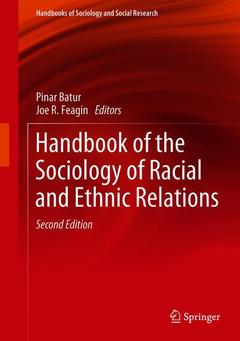Handbook of the Sociology of Racial and Ethnic Relations (2nd Ed., 2nd ed. 2018) Handbooks of Sociology and Social Research Series
Coordonnateurs : Batur Pinar, Feagin Joe R.

The study of racial and ethnic relations has become one of the most written about aspects in sociology and sociological research. In both North America and Europe, many "traditional" cultures are feeling threatened by immigrants from Latin America, Africa and Asia. This handbook is a true international collaboration looking at racial and ethnic relations from an academic perspective. It starts from the principle that sociology is at the hub of the human sciences concerned with racial and ethnic relations.
Introduction-“Racial and Ethnic Relations Today”; Pinar Batur, Joe Feagin and Hernán Vera.- Part I. Classical Debates: Upholding the Color Line.- Chapter 1. White; Charles A. Gallagher.- Chapter 2. The Struggle of Indigenous Americans: A Socio-Historical View; James Fenelon.- Chapter 3. The Not-So-Harmless Social Function of a Word that Wounds; Debra Walker King.- Chapter 4. The Racial State; Rodney D. Coates.- Part II. Institutions that Bind: History Matters!.- Chapter 5. Racism and Popular Culture; Jennifer C. Mueller, Apryl Williams and Danielle Dirk.- Chapter 6. African American Families: Historical and Contemporary Forces Shaping Family Life and Studies; Amanda Moras, Constance Shehan and Felix Berardo.- Chapter 7. Race and Ethnicity in the Labor Market: Employer Practices and Worker Strategies; Roberta Spalter-Roth.- Chapter 8. Racial and Ethnic Health Inequalities: An Intersectional Approach; Lynn Weber, Ruth Zambrana, Elizabeth Fore and Deborah Parra-Medina.- Chapter 9. Rethinking Racial Progress; Victor Ray.- Part III. Politics and Economics of Conflict and Change: Rationalization of Racial and Ethnic Hierarchy.- Chapter 10. What Would a Racial Democracy Look Like?; Peter Kivisto and Andrey Rezaev.- Chapter 11. The Diversity of Diversity of Education; Amir Marvasti, Karyn McKinney and Brad Pinter.- Chapter 12. The Reality and Impact of Legal Segregation in the United States; Ruth Thompson-Miller and Joe R. Feagin.- Chapter 13. UNITED STATESIANs: The Nationalism of Empire; Melanie E.L. Bush.- Part IV. From a Global Perspective: Colonial Legacies, and Post-Colonial Realities.- Chapter 14. A Dialectical Understanding of the Vulnerability of International Migrants; Jorge A. Bustamante.- Chapter 15. Research Literature on Haitian Americans : Trends and Outlook; Yanick St. Jean.- Chapter 16. “At least we don’t have Trump”: Canadian Racism’s Systemic Character – A Countersystem Perspective; Kimberley Ducey.- Chapter 17. Heart of Violence: Global Racism, War, and Genocide; Pinar Batur.- Part V. Recent Debates: Our Voices will be Heard!.- Chapter 18. What Hides in Comparative Method; Carlos Alamo-Pastrana.- Chapter 19. Agriculture as Resistance; Isaac Sohn Leslie and Monica M. White.- Chapter 20. Bureaucratic Capitalism, Mass Incarceration and Race and Ethnicity in America; Karen Manges Douglas, Gideon Sjoberg , Regelio Sáenz and David G. Embrick.- Chapter 21. The Influence of Sexual Racism on Erotic Capital: A Systemic Racism Perspective; Jesus Gregorio Smith, Cristina Morales and Chong-Suk.- Chapter 22. Lost and Damaged: Environmental Racism, Climate Justice, and Conflict in the Pacific; Danielle Falzon and Pinar Batur.- Chapter 23. Antiracism; Eileen O’Brien.- Part VI Conclusion.- 24. Future Challenges to the field of Sociology of Racial and Ethnic Relations; Joe Feagin and Hernán Vera.
Brings together in one volume evolving, contemporary and critical debates in race and ethnic studies
Conceptualizes new realities of race and ethnic relations
Examines contemporary issues and critical discussions regarding race and ethnic relations from a global perspective
Date de parution : 06-2018
Ouvrage de 434 p.
17.8x25.4 cm
Thème de Handbook of the Sociology of Racial and Ethnic Relations :
Mots-clés :
Racial and Ethnic Relations; Struggle of Indigenous Americans; Health Care Disparities; Racial Relations; Social Psychology; Racism and Popular Culture; Race and Ethnicity in the Labor Market; Racial and Ethnic Health Inequalities; Politics and Economics of Conflict and Change; Racial Democracy; Impact of Legal Segregation in the United States; Vulnerability of International Migrants; Canadian Racism’s Systemic Character; Global Racism; War; and Genocide; Race and Ethnicity in America; Sexual Racism on Erotic Capital; Environmental Racism in the Pacific; ethnicity; class; gender and crime
